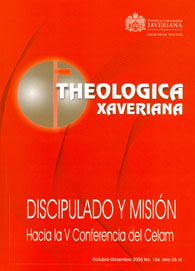Abstract
The present article intends to offer a theological-spiritual reflection on the theme of Christian discipleship. The method is that of studying key biblical texts that describe the discipleship, beginning with the Old Testament and ending in the novelty of Jesus Christ and his good news. Then it searches to emphasize the consequences of that discipleship regarding its communitarian, ecclesial, and missionary exigencies. It concludes with some topics that characterize the Christian discipleship of today in Latin America.
FARMER W., ED. The International Bible Commentary, Collegeville, The Liturgical Press, Minesotta, 1998.
FISCHER, GERSON, Em tempo de discipulado - Cartas gerais. Encontro Publicações, Curitiba/PR, Brasil, 1999, 172pp.
MOINGT, J., El hombre que venía de Dios, Desclée, Bilbao, 1999.
PALÁCIO, C., Jesús Cristo: história e interpretação, Loyola, São Paulo, 1980.
RAHNER, K., “Theós en el Nuevo Testamento”, en Escritos de Teología, Taurus, Vol. IV, Madrid, 1975.
SOBRINO, J., A fé em Jesus Cristo. Ensaio a partir das vítimas, Vozes, Petrópolis, 2000.
TORRES QUEIRUGA, A., Repensar a cristologia, SP, Paulinas, 2001.
ZUKOWSKI R., ELVIRA, “El discipulado como un ministerio de cada creyente”, en Revista Iglesia y Misión, Vol. 3, No. 3.
This journal is registered under a Creative Commons Attribution 4.0 International Public License. Thus, this work may be reproduced, distributed, and publicly shared in digital format, as long as the names of the authors and Pontificia Universidad Javeriana are acknowledged. Others are allowed to quote, adapt, transform, auto-archive, republish, and create based on this material, for any purpose (even commercial ones), provided the authorship is duly acknowledged, a link to the original work is provided, and it is specified if changes have been made. Pontificia Universidad Javeriana does not hold the rights of published works and the authors are solely responsible for the contents of their works; they keep the moral, intellectual, privacy, and publicity rights.
Approving the intervention of the work (review, copy-editing, translation, layout) and the following outreach, are granted through an use license and not through an assignment of rights. This means the journal and Pontificia Universidad Javeriana cannot be held responsible for any ethical malpractice by the authors. As a consequence of the protection granted by the use license, the journal is not required to publish recantations or modify information already published, unless the errata stems from the editorial management process. Publishing contents in this journal does not generate royalties for contributors.


